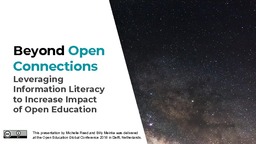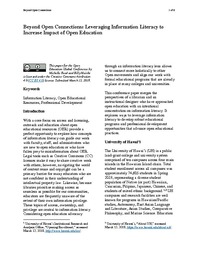
ATTENTION: The works hosted here are being migrated to a new repository that will consolidate resources, improve discoverability, and better show UTA's research impact on the global community. We will update authors as the migration progresses. Please see MavMatrix for more information.
Show simple item record
| dc.contributor.author | Reed, Michelle | |
| dc.contributor.author | Meinke, Billy | |
| dc.date.accessioned | 2018-03-15T23:40:49Z | |
| dc.date.available | 2018-03-15T23:40:49Z | |
| dc.date.issued | 2018 | |
| dc.identifier.uri | http://hdl.handle.net/10106/27285 | |
| dc.description.abstract | For over a century, academic librarians in the United States have provided instruction designed to help patrons effectively navigate and use the resources and services provided by the library. Today we refer to this type of learning experience in terms of “information literacy.” As digitization has shaped the ways that we access and share information, so, too, has information literacy evolved to represent a more nuanced relationship between the people who create and consume information and the systems we use to communicate in a networked world. In January 2016, the Association of College and Research Libraries (ACRL) adopted a new Framework for Information Literacy for Higher Education, which transitioned librarians from a skills-based approach to teaching and learning to a conceptual one. Though the language in the Framework is student-centric, as are the information literacy programs that operate out of academic libraries, we argue that the knowledge practices and dispositions represented in the document apply to educators as much as they do to the students we serve—particularly in the context of open education. With its heavy focus on copyright and licensing, outreach and education about open educational resources (OER) provide a perfect opportunity to explore how concepts of information literacy can guide our work with faculty, staff, and administrators who are new to open education or who have fallen prey to misinformation about OER. Additionally, though the term “information literacy” grew from libraries, we acknowledge that librarians do not fully own the responsibility of deepening our communities’ understanding of the information ecosystem. In this presentation, a librarian and an instructional designer discuss how information literacy concepts can inform how we support open education and how we leverage existing information literacy programs to broaden the impact of our work. | en_US |
| dc.description.sponsorship | Association of College & Research Libraries’ Value of Academic Libraries Travel Scholarship | en_US |
| dc.language.iso | en_US | en_US |
| dc.publisher | Open Education Global Conference | en_US |
| dc.rights | Attribution 3.0 United States | * |
| dc.rights.uri | http://creativecommons.org/licenses/by/3.0/us/ | * |
| dc.subject | information literacy | en_US |
| dc.subject | open educational resources | en_US |
| dc.subject | professional development | en_US |
| dc.title | Beyond Open Connections: Leveraging Information Literacy to Increase Impact of Open Education | en_US |
| dc.type | Presentation | en_US |
Files in this item
- Name:
- BeyondOpenConnections_Slides.pdf
- Size:
- 2.213Mb
- Format:
- PDF
- Description:
- Slides PDF
- Name:
- Beyond_Open_Connections_2018.pdf
- Size:
- 651.1Kb
- Format:
- PDF
- Description:
- Paper PDF
- Name:
- license_rdf
- Size:
- 1.337Kb
- Format:
- application/rdf+xml
This item appears in the following Collection(s)
Show simple item record
Except where otherwise noted, this item's license is described as Attribution 3.0 United States




